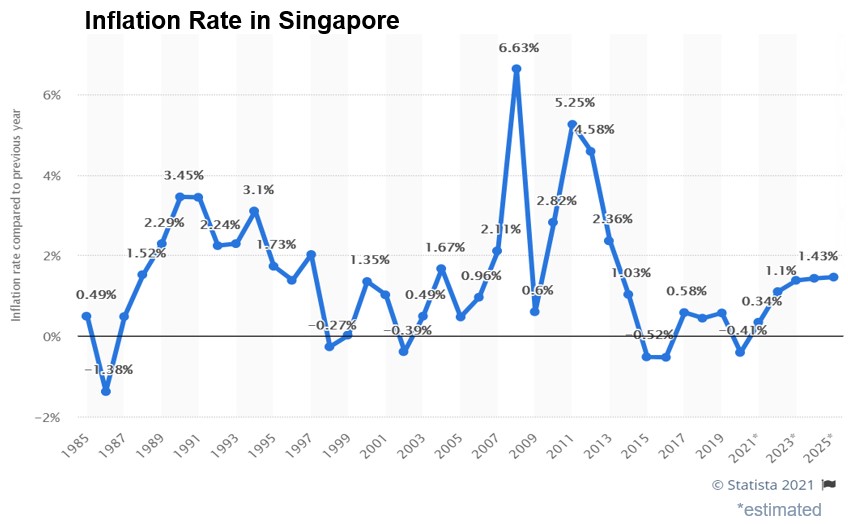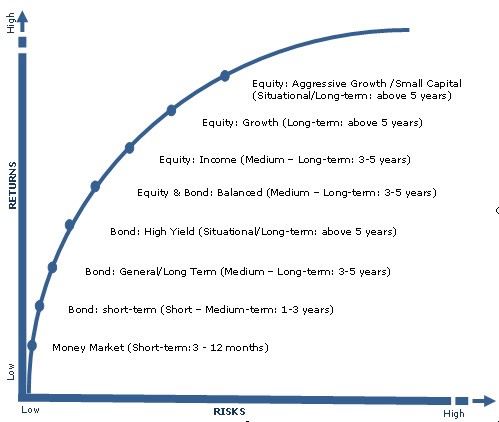|
Start small, start somewhere: 3 good reasons why & how to start investing 11 May 2021 
Do you find yourself pondering over “is it a good time to invest now”, or “what if markets turn red after I made an investment”? Or have you put off a potential investment only to grouse months later “if only I had invested then”?
You’re not alone. Investing can be filled with uncertainty. But here’s our take on 3 reasons why we think you should not delay your investing journey, as well as 3 simple steps to get your feet wet.
Reason 1: Inflation, Time Value of Money (TVM) and the power of compounding The time value of money draws from the idea that investors prefer to receive the same amount of money today rather than in the future because of the potential to grow its value over time.1 Its importance is best illustrated with the power of compounding.
For example, putting money in a savings deposit account with a bank earns you 0.05% per dollar each year. Every dollar saved grows over time, and the additional 0.05% earned in the previous year grows another 0.05% by the following year, until you withdraw the amount. This continued growth is termed “compounding” and the impact of starting earlier does compound over time. No pun intended.
Let’s now throw inflation into the mix, which decays the value of your money over time. 
Source: Statista
If the money in your bank is growing 0.05% a year, and inflation has generally outstripped that, the purchasing power of every dollar you have painstakingly saved had actually weakened over time. In fact, your savings in the bank giving you a return of 0.05% is insufficient to cover inflation at all.
Reason 2: There’s no perfect time nor perfect record Investing can be a double-edged sword if you do not manage it well. Which is why it pays to be aware of (but not crippled by) the risks of investing.
Most investors, professional or not, are bad at timing the markets. Even Warren Buffett, widely regarded as one of the most successful investors, had years in which he severely underperformed the markets.

Despite being widely considered as one of the most successful investors in the world, Warren Buffett, who runs Berkshire Hathaway, had occasionally underperformed the S&P 500 in several calendar years.
More often than not, they make present an opportunity to make you a better investor. It may seem daunting at first, but once you have made your first investment and gone through some market volatility, you will find it easier to manage your investment portfolio and open yourself to more investment options. Start small, start somewhere.
Reason 3: There’s something for everybody In today’s digital age, the average investor has plenty of channels through which they can invest. Not only that, they also able to participate in financial instruments that were previously reserved only for financial institutions, as we have seen in the GameStop saga that unfolded at the beginning of the year. That said, not every investment vehicle is appropriate for everyone when considering the level of risk an individual can comfortably assume.
One of the allure of unit trusts is that there is always a strategy for all kinds of investment out there. While more specialised and out-of-the-norm funds (i.e. hedge funds) are typically not available to the public investor, there’s already an abundance to choose from. For example, we have more than 1,000 funds available on dollarDEX, across varying asset classes, geographical regions, and/or sectors. So, there is something that suits you!
There’s no need to chase sexy returns if that is not what you are after. Everyone has their own risk appetite and tolerance. It is more important to be cognizant of the risks you are willing to take and to only assume a level within your risk tolerance. Low risk may mean low returns, but no risk means no returns.
New investors often find it daunting to get started, sometimes having a haunting impression that one must be on top of everything. No, you don’t have to, all you need is to devise a plan that works for you and that you are comfortable with when volatility comes knocking.
Here’s how you can get your feet wet in 3 simple steps!
Step 1: Work out your finances The internet is your friend. There are tons of books, resources and financial sites that offer excellent tips on tidying your finances. If finance is not your forte, or if you just do not have the time, try reaching out to financially savvy friends or a trustworthy financial planner who specialises in wealth planning to get the ball rolling. Keyword: trustworthy.
After tidying your finances, you should know how much money you can comfortably set aside for investments with your long-term financial goals in mind. It is important that you are comfortable with the idea that this portion of your wealth that will be subjected to at least some levels of risks.
Step 2: Understand your investment goals, horizon and risk tolerance Are you particularly sensitive to short-term losses, or are you willing to accept fluctuations in your portfolio? Do you seek to beat inflation over the long run, or are you seeking to maximize your portfolio growth over time? These are questions you will need to understand about yourself and will affect your investment decisions accordingly.
Like all other goals, your investment goals should be SMART - Specific, Measurable, Achievable, Realistic and Time-specific.
Tip: A simple way to determine your investor profile is to take the questionnaire on our dollarDEX investment portfolio.
Step 3: Invest the way you like it First of all, you need to pick a right investment vehicle that suits you. Here’s an infographic that plots the risk level and expected return of different fund types, and the time horizon typically associated with each respective type. 
Source: Areca Capital
While there are many other investment vehicles available, unit trusts offer a fuss-free and cost-effective way to gain professional investment management and diversified exposures into specific asset class (i.e. equities, fixed income, alternatives etc), regions (i.e. North America, Asia Pacific, Europe, Southeast Asia etc), or sectors (i.e. Healthcare, Technology, Real Estate, Infrastructure etc).
Find out how unit trusts stack up against stocks and ETFs here.
Remember, you don’t have to be an expert since day one, or ever. Let the professionals do their job, while you stay focused and disciplined (and realistic) about your financial goals. Be honest with yourself as there is no one to judge you. Pick investment options that suit you if you are sensitive to risk. There is nothing wrong with not being able to stomach risks like your friends or family members. Be true to yourself and start small, start somewhere.
YOU MAY ALSO LIKE THIS
|




